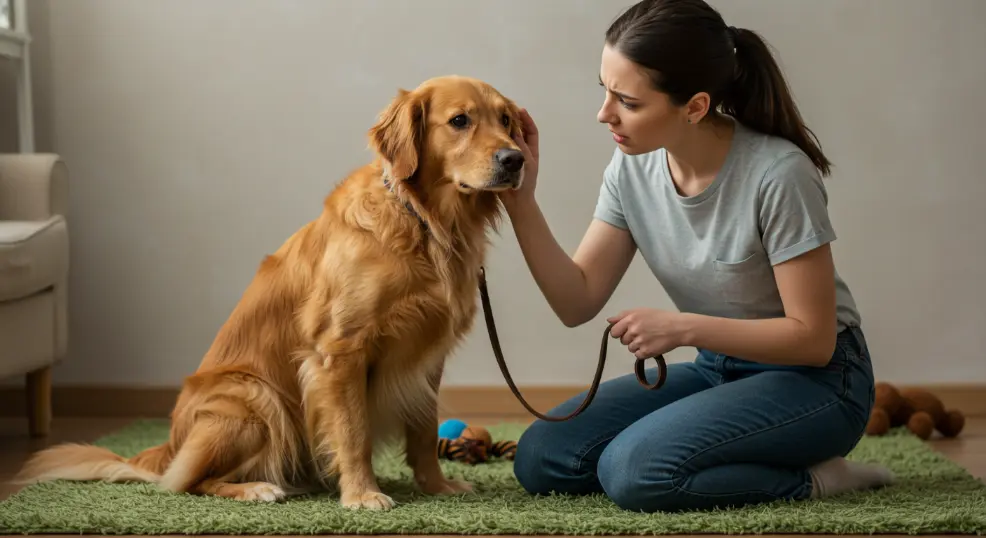Golden Retriever Anxiety: Causes and Simple Solutions
If you’ve ever lived with a Golden Retriever, you already know how full of love, joy, and goofy energy they are. These dogs are often called the “family dog of America” because they’re so friendly and loyal. But here’s the thing many owners don’t expect—golden retriever anxiety is actually pretty common.
Your sweet pup may look happy-go-lucky, but deep down, they can get stressed out just like people do. And when golden retriever anxiety isn’t understood, it can turn into bigger behavior or health issues. Let’s dig into why this happens, what signs to watch for, and how to make life calmer for your furry friend.

Why Golden Retrievers Struggle with Anxiety
Golden Retrievers are ranked among the top 3 most popular dog breeds in the U.S. (AKC data). They’re bred to be companion dogs and working partners, which means they naturally crave social interaction. This is amazing if you have a busy household where someone’s always around. But it also means they’re more prone to anxiety when things don’t feel right.
Studies show that about 23% of dogs suffer from some type of anxiety issue, and golden retrievers sit on the higher end of that spectrum because of their sensitive nature.

Causes of Golden Retriever Anxiety
There isn’t just one reason for golden retriever anxiety—it’s usually a mix of things. Let’s look at some of the most common triggers.
1. Separation Anxiety
This is hands down the biggest reason for golden retriever anxiety. They hate being left alone. If you go to work and your pup is pacing, whining, or chewing the couch by the time you come back, separation anxiety is likely the cause.
2. Loud Noises
Fireworks, thunderstorms, vacuum cleaners—Golden Retrievers don’t handle loud surprises well. Their sharp hearing makes them extra sensitive to sound.

3. Changes in Environment
Moving to a new home, new family members, or even rearranging furniture can throw them off balance. Golden Retrievers thrive on routine and stability.
4. Lack of Exercise
These dogs were bred as working retrievers, which means they need a lot of physical and mental exercise. Without it, all that bottled-up energy can turn into anxious behavior.

5. Genetics and Past Trauma
Sometimes golden retriever anxiety is simply inherited. Dogs from poor breeding lines may be more prone to stress. Also, rescues with rough pasts often carry that baggage into their new homes.

Signs Your Golden Retriever Has Anxiety
Not all anxiety looks the same. Some dogs become destructive, while others shut down. Here are the main signs of golden retriever anxiety:
- Constant whining or barking when left alone
- Destructive chewing (shoes, furniture, doors)
- Digging or scratching at doors
- Excessive drooling or panting
- Pacing back and forth
- Sudden accidents indoors (even if house-trained)
- Hiding or trying to escape
- Over-grooming or licking paws obsessively
If your golden shows more than a couple of these signs regularly, it’s worth paying attention.

Simple Solutions for Golden Retriever Anxiety
The good news? With patience and consistency, you can ease golden retriever anxiety. Let’s break it down into simple strategies that actually work.
1. Daily Exercise is a Must
Golden Retrievers need at least 60 to 90 minutes of exercise a day. A bored golden will quickly turn anxious. Long walks, fetch, swimming, or even agility games will do wonders.
2. Mental Stimulation
Anxiety isn’t just physical—it’s mental too. Try puzzle toys, treat-dispensing balls, or hide-and-seek games with their favorite toy. A tired brain is a calm brain

3. Gradual Alone Training
If separation anxiety is the issue, practice leaving your pup alone in small doses. Start with just 5 minutes, then slowly build up time. Don’t make a big deal about leaving or returning—it helps normalize it.
4. Comfort Tools
Some anxious goldens love weighted anxiety vests or calming blankets. Others respond well to soft background music (yes, dog playlists on Spotify are a thing!).
5. Stick to Routine
Feeding, walks, playtime—try to keep it consistent. Predictability lowers stress for golden retrievers.
6. Training and Commands
Basic obedience training not only gives structure but also builds confidence. When your golden feels secure in what’s expected, anxiety lessens.
7. Calming Supplements
Vet-approved supplements with ingredients like L-theanine, chamomile, or CBD oil (dog-safe) may help in certain cases. Always talk to your vet first.
8. Professional Help
If golden retriever anxiety is extreme, a certified behaviorist or vet may recommend specific therapy methods or, in rare cases, short-term medication.

Real-Life Examples
I once met a golden named Daisy who would completely destroy blinds whenever her owners left. The solution wasn’t scolding her—it was slowly crate-training with lots of positive reinforcement. Within months, Daisy could stay home for four hours without panic.
Another golden, Max, trembled during every thunderstorm. His family tried a thunder vest combined with soft classical music, and it made a world of difference. These small changes often bring big results when dealing with golden retriever anxiety.

Mistakes to Avoid
Sometimes we accidentally make golden retriever anxiety worse without realizing it. Here are some pitfalls to watch out for:
- Punishing anxious behavior (this only increases fear)
- Making a dramatic exit or entrance (keeps your dog on high alert)
- Skipping exercise on busy days (goldens will find their own outlet… usually destructive)
- Assuming they’ll “grow out of it” (most don’t without help)

FAQs About Golden Retriever Anxiety
1. What causes golden retriever anxiety the most?
Separation anxiety is the number one cause, since golden retrievers are very people-oriented and dislike being alone.
2. Can golden retriever anxiety be cured?
It can be managed very well, but some dogs may always have mild anxiety tendencies. With the right approach, symptoms usually improve a lot.
3. Do calming chews work for golden retriever anxiety?
Yes, many owners find them helpful, especially those with L-theanine or chamomile, but they should be paired with training.
4. Is crate training good for golden retriever anxiety?
Yes, if introduced gradually and positively. Crates can feel like a safe den for anxious dogs.
5. How do I know if my golden retriever has anxiety or just high energy?
If the behavior only shows up in stressful situations (like being left alone or hearing fireworks), it’s likely anxiety rather than just energy.
6. Does exercise really help golden retriever anxiety?
Absolutely. Lack of exercise is one of the biggest triggers for anxiety in goldens.
7. Can golden retriever anxiety lead to health problems?
Yes. Chronic stress can weaken the immune system, cause digestive issues, or worsen skin problems.
8. Should I get another dog to help with golden retriever anxiety?
Sometimes it helps, but not always. A second dog is a big commitment and won’t necessarily solve anxiety if the root issue isn’t addressed.

References
- American Kennel Club – Golden Retriever Breed Info
- ASPCA – Separation Anxiety in Dogs
- Journal of Veterinary Behavior – Canine Anxiety Studies
- PetMD – Anxiety in Dogs: Causes and Treatmen
we have many helpful blog post about Golden Retriever, you might want to check them out
Choosing a Golden Retriever Puppy: Tips for New Owners
Golden Retriever Cartoons That’ll Make You Smile
Golden Retriever Puppy Milestones: Birth to 6 Months






